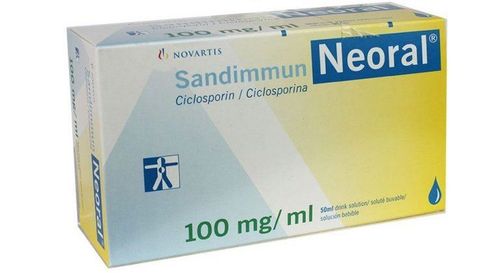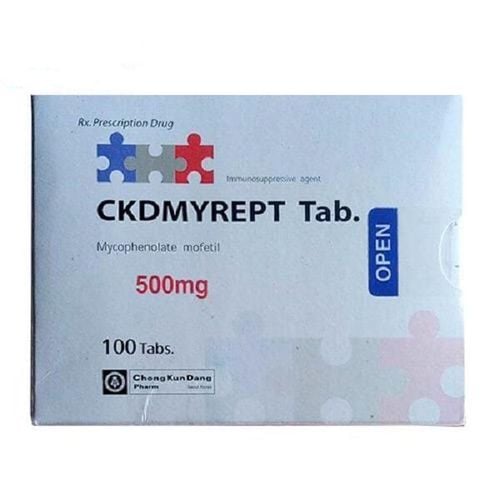This is an automatically translated article.
Advagraf drug has the main active ingredient Tacrolimus and other excipients in a sufficient amount. Advagraf belongs to the group of anti-cancer drugs and affects the immune system. The drug is indicated for people after liver transplant, kidney transplant to prevent transplant rejection.
1. What is Advagraf?
Advagraf drug has the main active ingredient is Tacrolimus in the form of Tacrolimus monohydrate, the content of 1mg and other excipients in a sufficient amount. Advagraf belongs to the group of drugs that fight cancer and affect the immune system. The drug is formulated in the form of an extended-release hard capsule, suitable for direct oral administration. Packing is 1 box of 5 blisters, each blister contains 10 tablets. The drug is indicated for people after liver transplant, kidney transplant to prevent transplant rejection.
Main active ingredient Tacrolimus is an immunosuppressive active ingredient of the Macrolide group. Tacrolimus drug has the ability to bind to intracellular proteins to form FKBP12-Tacrolimus complexes to compete with and inhibit Calcineurins. This process is responsible for blocking calcium-dependent T-lymphocyte signal transduction. Therefore, the drug is effective in inhibiting the transcription of a set of cytokines. In addition, the active ingredient Tacrolimus also has the effect of preventing the formation of cytotoxic Lymphorus, creating favorable conditions to prevent transplant rejection.
2. What are the effects of Advagraf?
Advagraf 1mg drug is indicated for people after liver and kidney transplantation to prevent transplant rejection. Treatment of allogeneic rejection in adults.
3. Usage and dosage of Advagraf
3.1. How to use the drug Advagraf is formulated in the form of an extended-release hard capsule, suitable for direct oral use. It should be taken once a day in the morning. When taking the drug, it is necessary to swallow the tablet whole with liquid, on an empty stomach, or at least 1 hour before or 2 to 3 hours after eating. Using the drug, adjusting the dose, stopping the drug requires professional medical supervision, only used when prescribed by the treating doctor. When oral medication cannot be used immediately after surgery, it can be administered intravenously at a dose of approximately 1⁄5 oral doses. 3.2. Dosage The dose of Advagraf depends on the pathology and response capacity of each specific case. The treating physician will make a clinical assessment to determine the appropriate therapeutic dose of the drug after surgery for each person. The following doses are for reference only.
3.2.1. Prophylaxis of kidney transplant rejection Initial treatment dose: 0.2-0.3mg/kg per day, used once. Medication should be used within 24 hours of surgery. 3.2.2. Prevention of liver transplant rejection Initial treatment dose: 0.1-0.2mg/kg per day, used once. Medication should be used within 12 to 18 hours after surgery is completed. 3.2.3. Anti-allogeneic rejection for people after liver and kidney transplantation Initial dose: 0.2-0.3mg/kg per day, used once. 3.2.4. Anti-allogeneic rejection for people after heart transplant Initial treatment dose: 0.15mg/kg per day, used once.
After using the starting dose, the treating doctor will evaluate the response of each specific person to give further indications, can continue using or stop using the drug if the response is good.
4. In case of over/missing dose of Advagraf
In case of missed dose: You need to take the medicine on the same day. Absolutely, do not take the medicine with a double dose the next day.
In case of overdose: When using an overdose of the drug, there may be some adverse effects such as nausea, vomiting, infection, urticaria, somnolence, increased creatinine concentration, increased urea nitrogen in the blood, increased serum Alanine aminotransferase index. If you have accidentally overdosed and have serious unwanted effects, immediately go to the medical center for timely treatment.
5. Advagraf unwanted effects
Common undesirable effects when treated with Advagraf are hand tremors, increased blood sugar levels, increased blood potassium and increased blood pressure, kidney failure, insomnia... Cardiovascular system such as: arrhythmia, tachycardia, heart failure, arrhythmia, palpitations,... Disorders to the blood system: anemia, abnormal red blood cells, decreased risk platelets, ... Nervous system disorders: headache, muscle tone increase or weakness, memory impairment, cognitive impairment... In addition, when using Advagraf drug may appear affecting vision, disorders of the digestive system, kidneys, urinary tract, endocrine system... If you see any unwanted effects on health, you should immediately notify your treating doctor or pharmacist. for timely and proper handling.
6. Advagraf drug interactions
The use of Advagraf with drugs that induce or inhibit CYP3A4 may alter the metabolism of Advagraf in the blood, potentially increasing or decreasing drug concentrations.
When using Advagraf in combination with drugs such as Aminoglycosides, Gyrase inhibitors, antipyretic analgesics, anti-inflammatory drugs of the non-Steroid group or NSAID group, Vancomycin, Acyclovir... increase nephrotoxicity or neurotoxicity terrible.
Avoid taking Advagraf with foods high in potassium or potassium-sparing diuretics.
Use caution when using Advagraf with immunosuppressive drugs.
Avoid using Advagraf while using live attenuated vaccines.
To ensure safety and effectiveness, it is necessary to proactively inform the treating doctor about all medicines, health foods that are being used and other diseases that are being acquired.
7. Some notes when using Advagraf
7.1. Note and caution when using the drug Follow the treatment dose of Advagraf prescribed by the treating doctor, do not stop or exceed the prescribed dose. The use of Advagraf in children is limited, so it should be considered when used in this audience. Advagraf should be used with caution in people with kidney failure, liver failure or other medical conditions. If you have any questions or have any unusual symptoms, please notify and ask the treating doctor. 7.2. Use of Advagraf in Pregnancy and Lactation For Pregnant Women: Animal studies have shown embryotoxicity. Advagraf crosses the placenta. Data are limited, and some cases of miscarriage, neonatal hyperkalemia, and preterm birth have been reported. Advagraf can be used when no alternative is available. However, it is important to strictly follow the instructions of the treating doctor. For nursing mothers: Advagraf is excreted in breast milk, harm to the fetus cannot be excluded, so it should not be used during this period. For those who drive and operate machines: Side effects include visual and neurological disturbances affecting the ability to drive and use machines. Therefore, while taking the drug, you should limit performing tasks that require high concentration. Above is all the important information about Advagraf. Using the right dosage and method of use will help bring better treatment results.
Please dial HOTLINE for more information or register for an appointment HERE. Download MyVinmec app to make appointments faster and to manage your bookings easily.













